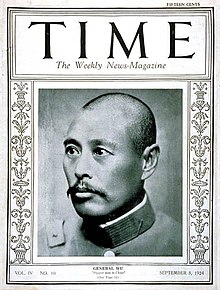Wu Peifu
The two clashed over methods of dealing with the restive south, with Duan pushing for military conquest and Feng preferring negotiation.
Feng died in 1919 and the leadership of the Zhili Clique was secured by Cao Kun with the support of Wu Peifu and Sun Chuanfang.
Cao and Wu began to agitate against Duan and the Anhui clique and issued circular telegrams denouncing his collaboration with Japan.
At this juncture, Cao Kun and Wu Peifu began to organize a wide-reaching alliance including all opponents of the Anhui clique.
In November 1919 Wu Peifu met with representatives of Tang Jiyao and Lu Rongting (warlords of Yunnan and Guangxi, respectively) at Hengyang and signed a treaty titled “Rough Draft of the National Salvation Allied Army” (救国同盟军草约), forming the base of the anti-Anhui clique alliance that also included Zhang Zuolin's powerful Fengtian clique.
He executed several outflanking maneuvers that forced the western front of the Fengtian army back towards Beijing, then he lured it into a trap by feigning retreat.
Zhang Zuolin was forced to order a general retreat towards Shanhaiguan, thereby ceding control of the capital to Wu and the Zhili clique.
Wu's reputation with the Chinese people suffered significantly because of this event, though he gained the favor of British and American business interests operating in China.
Zhang Zuolin in Manchuria and Sun Yat-sen, then in Guangdong, quickly declared their support for the Anhui clique and geared up for war.
Now called the "Jade Marshal" (玉帥) and generally acknowledged to be China's ablest strategist at the time, Wu Peifu was widely expected to win, and by doing so to finally put an end to various quasi-independent regional authorities.
Hundreds of thousands of men fought in this major battle between Zhang's Fengtian army and Wu's Zhili forces.
Wu Peifu's military strategy was thrown into confusion by this catastrophe in his rear, and he was defeated by Zhang's forces near Tianjin.
Wu maintained a power base in Hubei and Henan in central China until he was confronted by the Kuomintang army during the Northern Expedition in 1927.
He was a nationalist, and refused to enter foreign concessions—not even to hide from his enemies—because he viewed them as an affront to China, and instead chose a much more perilous method of escape.



